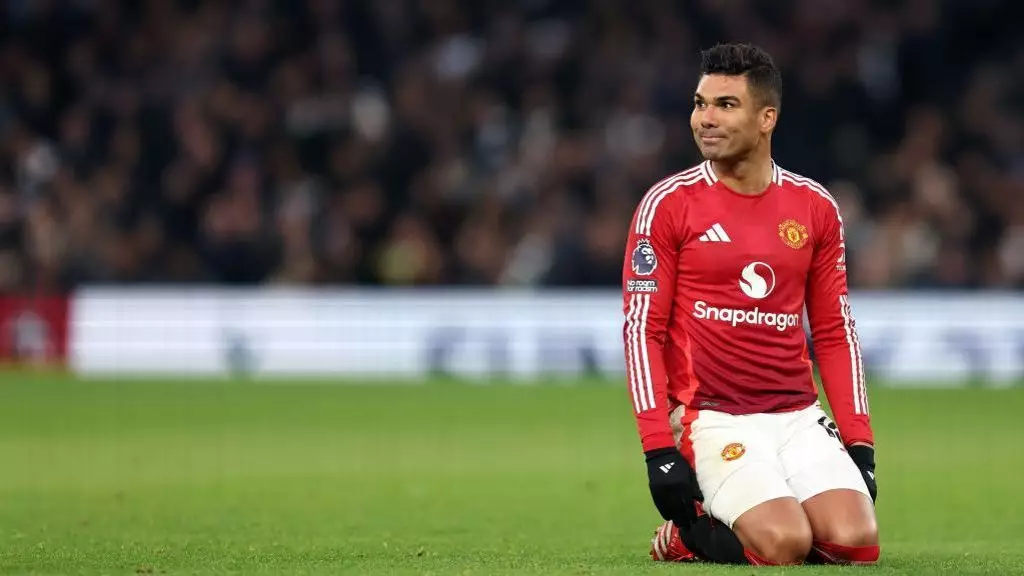As the 2024-25 Premier League season unfolds, Manchester United finds itself grappling with an identity crisis. Despite high expectations, the team has struggled deeply, currently sitting in the uninspiring position of 15th on the league table. In this tumultuous atmosphere, veteran midfielder Casemiro has voiced his desire to remain at the club until the end of his contract in 2026, a clear testament to his loyalty amidst adversity. His commitment is undoubtedly admirable; however, it raises pertinent questions about the nature of his role at the club moving forward.
Casemiro has not enjoyed the same influence on the pitch since joining United from Real Madrid in 2022. In the recent match against Tottenham, his starting position offered a glimmer of hope, yet it was overshadowed by the team’s inability to secure a win. His absence from starting lineups in 10 out of the previous 11 league matches under new coach Ruben Amorim reflects a broader issue concerning player performance and management strategy. The profound question remains: how will Casemiro adapt to and embrace his shifting position within the team’s hierarchy, and can he turn the tide of his current situation?
In an interview with Diario AS, Casemiro expressed a deep fondness for Manchester United and highlighted the adjustments his family has made in settling in the city. His pride in the culture and community reflects a broader narrative—how a player’s off-the-pitch life significantly influences their performance on it. “I’m comfortable here, and my family is too,” he asserts. This personal stability can often translate into on-field performance, reflecting the importance of holistic player well-being.
However, as he acknowledges, the discomfort of warming the bench is not lost on him. “Happy on the bench? Of course not, that’s something else,” he articulated, revealing the inner conflict many athletes face when personal aspirations clash with team dynamics. Understanding one’s role within a competitive environment is crucial, and it raises questions about whether loyalty can withstand the fleeting nature of professional sports.
Casemiro’s journey has been met with criticism since moving to England, with many pundits opining that he has not maintained the stellar form that characterized his time at Real Madrid. With a resume boasting five Champions League titles, one must consider whether his decline is symptomatic of a broader trend in player performances or specific to his situation at United. He boldly dismissed these claims, affirming, “I’m young, and I’ve got a lot left to give.” To a degree, this response embodies the mantra of many athletes who must continually prove their worth while facing immense scrutiny.
The midfielder’s references to nutritional advancements and personal fitness echo a wider transformation in modern sports, where longevity and performance are increasingly a function of personal care and discipline. Nevertheless, the question remains: can Casemiro genuinely reclaim his previous level of influence within a struggling squad? The physicality of the Premier League demands an evolution in his game if he is to remain relevant.
Casemiro’s commitment to his own growth is paralleled in his observations about peers such as Vinícius Júnior and Kylian Mbappé. He encourages Júnior to prioritize legacy, reflecting a maturity that comes from years of elite experience. Similarly, he admires Mbappé’s continuing excellence, suggesting that his resolve to evolve as a player could draw inspiration from the rising talents around him.
His interactions with prominent players illustrate a focus on legacy—a consideration that is often overshadowed by day-to-day competitions. By positioning his experiences alongside younger talents, he cultivates a narrative not just of persistence but also of mentorship, seeking to influence the next generation while solidifying his own standing within football history.
As Manchester United navigates its turbulent voyage, Casemiro’s journey encapsulates the challenges faced by veterans in the emotionally charged theatre of modern football. His commitment to the club, tempered by a growing sense of self-awareness, sets the stage for a profound internal evolution. Casemiro’s future at Manchester United will not only depend on his performances but also on his ability to adapt, inspire, and ultimately redefine success within this storied club. As he approaches the final chapter of his career, the road ahead appears steep, yet with resilience, he stands poised to leave an indelible mark on the club’s legacy.

